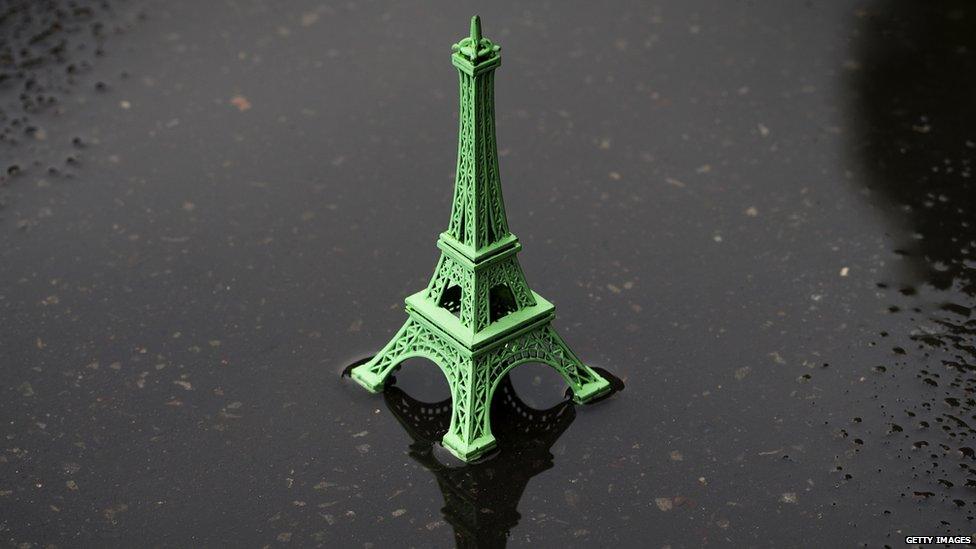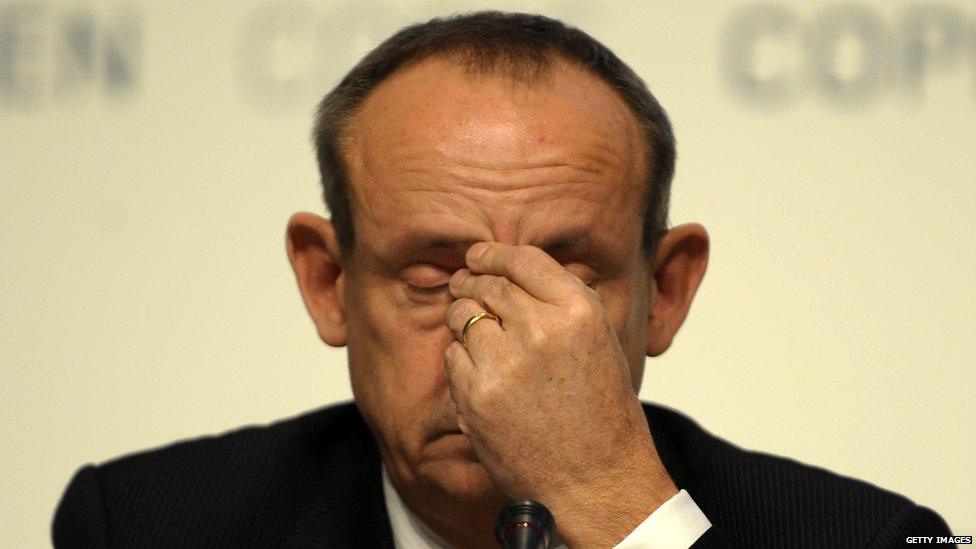Real deal or meal deal? Will new climate treaty be a 'nothing burger'?
- Published
- comments

France is investing significant political capital in securing a new global deal on climate change
The fate of the world won't be decided over the next three weeks - but the fate of a proposed global climate treaty just might be.
By the first week in October the world should have a good idea what the shape and scale of that ambitious project will be.
It's then that we'll find out if the putative agreement is, in the words of a senior negotiator, a "nothing-burger".
A real deal or a meal deal?
Last week's UN meeting in Bonn saw the parties grappling with a flabby, 83-page draft document, external that essentially lists every country's position on everything.
By the end of a slow set of negotiations in the former West German capital, there was little progress in slimming it down.
So to keep the project on the rails, the 196 parties agreed to give the two co-chairs of the talks permission to go away and slash, burn and shrink the weighty wish-list into a draft agreement for Paris.
Basis for agreement
In a briefing to reporters at the meeting, co-chairs Ahmed Djoghlaf and Dan Reifsnyder said that they would deliver a "concise, coherent and comprehensive" document by the first week of October and ahead of the last meeting of the parties before Paris.
They will take the long list, in some parts stretching to eight different options with plenty of square brackets on the text inside those options, and slim it down to something with about three options on each of the different aspects of the deal.
This new baby text is being called "the basis".
At that point, ministers are expected to step in and the political horse-trading should commence, leading to eventual agreement in Paris and an outbreak of "World Saved!" headlines.
Getting from the current War and Peace-like proportions to a text where words can actually be argued over really is the key step.

Former UN climate chief Yvo de Boer, who was in charge in the run up to Copenhagen in 2009
According to the two co-chairs, this draft agreement is going to happen, essentially because they're pretty amazing guys.
"The atmosphere we have been able to create, what we have been able to do in this time is remarkable, extraordinary if you will," said Dan Reifsnyder, without a hint of irony.
"If you base it on the past, we're way beyond what anybody could have hoped we'd be by now."
These UN wonder-chairs say the parties have enough faith to allow them to shape a draft treaty from deeply held national interests.
"Parties are engaging now among themselves, there is trust, increasing trust among themselves and with the co-chairs," said fellow chair, Ahmed Djoghlaf from Algeria.
"This is a tremendous achievement that you cannot quantify, and without this trust you will never get that agreement."
Spud-u-like
Not everybody is entirely happy with this way forward. Some negotiators feel that progress was slow last week in Bonn to ensure that the parties had no option but to turn to the co-chairs as the best means of moving forward.
There are concerns that attempts to "harvest" the sense of trust will lead to something that's merely a bowl of low hanging fruit - And in the words of one observer, so low hanging, they're actually potatoes.
I'm not sure the French, who will be chairing the meeting in Paris designed to "save the planet", will be happy with plain auld spuds as the main course.
Once the draft text is produced, the parties will then gather in Bonn one more time before heading for the summit in the French capital at the very end of November.
There are some vague bells ringing, reminding me of 2009.
In Barcelona at the meeting just before the ill-fated Copenhagen summit that year, the UN's climate chief finally admitted that a legally binding deal in the Danish capital was unlikely, external.
Things are very different now, say many of the participants and observers.
David Wei once worked as a climate adviser to the Marshall Islands and now represents the We Mean Business coalition, external.
He says the key difference is the amount of political capital invested by the US, the French and the Chinese.
"Where we are now is much, much better than where we were at the same time in 2009 in the lead up to Copenhagen," he told BBC News in Bonn.
"It's better not only in terms of the text but in terms of the tone, in terms of the trust and in terms of the narrative, and the strength of it."
UN executive secretary Christina Figueres says the proof will be in the pudding and the pudding will come out of the oven in Paris.
But whether it's a soufflé of substance, or a load of crepes, all the ingredients will be visible at October's great Bonn bake-off!
Follow Matt on Twitter @mattmcgrathbbc, external.